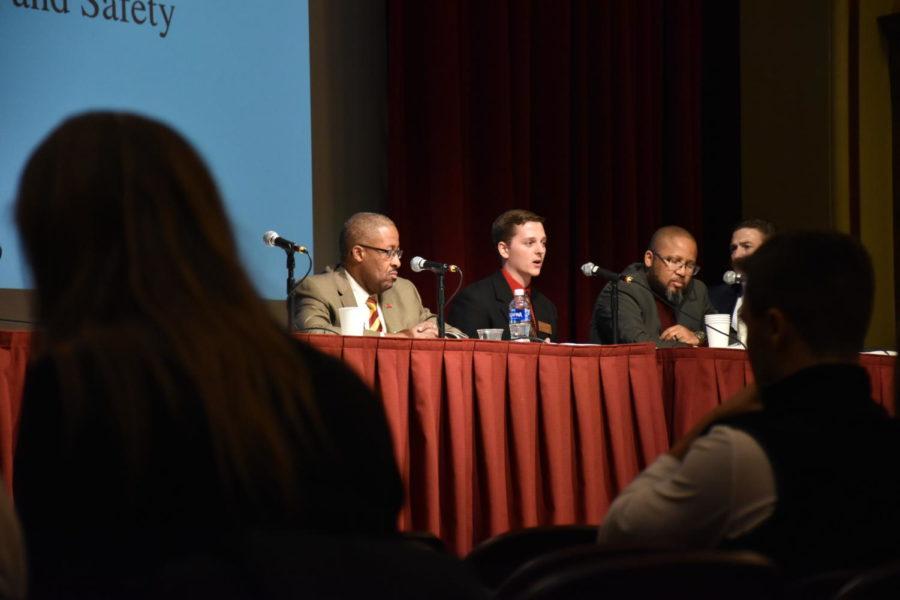- App Content
- App Content / News
- News
- News / Politics And Administration
- News / Politics And Administration / Campus
The town hall panel discusses four hot topics
Vice President of the Student Government Cody Smith speaks on gathering student input on the campus climate that can then be relayed up to school representatives.
November 9, 2017
Questions have been submitted to the town hall panel and broken down into four areas of discussion.
At Thursday’s town hall meeting, in the Great Hall of the Memorial Union, 30 to 40 people were in attendance. Vernon Hurte, dean of students, mediated the meeting.
The four topics addressed were campus climate, tuition, student health and wellbeing and enrollment.
Campus climate and the principles of community were discussed by Reginald Stewart, vice president for diversity and inclusion. He said officers are working on being more direct, and engaging more when it comes to receiving information.
Martino Harmon, vice president for student affairs, added that the principles of community represent where we stand as a university. He said the issue is centralizing climate information.
“We’re really trying to emphasize what we stand for as an institution, because we need to do that, we need to set the climate,” said Harmon.
The panel also spoke about what steps are being taken to make Iowa State affordable.
Chief financial officer, Miles Lackey said it comes down to raising private support and increasing state support. He also stressed how students should be informed about all of their financial options.
Harmon said the university is working with the ISU Foundation to make an emergency fund for any students in critical need of financial help.
Wickert spoke about how affordability effects faculty.
“I have to look faculty, who are working harder than ever, in the eye and tell them that they’re not getting a raise,” said Wickert.
Wickert also said the university will be looking to propose a raise in tuition for the next academic year.
Cody Smith, vice president for the student body, mentioned how the student government makes a point to share specific financial issues with the board of regents.
Student health, wellbeing and safety was also addressed.
A question directed at Harmon asked about mental health services. He said all students’ health is of critical importance. The wellness services offered to students with these issues have now collaborated and are even easier for students to utilize.
Regarding student’s safety, Lackey said there has been a 30 percent increase of officers on patrol.
The panel then discussed if the university would consider limiting enrollment.
Harmon said this is a difficult topic because current enrollment rates allow for diversity on campus.
An upcoming change is the implementation of enrollment management. This means the university can calibrate recruitment based on the students it wants.
Standards have been increased for transfer students. The minimum accepted GPA was a 2.0, but is now a 2.25. This has been proven to help with enrollment issues.
Wickert mentioned how universities who do cap enrollment, generally see application rates plummet.
Later during the meeting, the audience was asked to speak up with any comments or questions.
A student asked the panel about a discriminatory tweet which she felt was not dealt with correctly. She said it was simply ignored due to freedom of speech.
Harmon addressed her saying the university did not ignore the tweet. The group who posted the tweet was asked to remove it and did. No further action can be taken because political speech is protected under the first amendment.
Another student asked about differential tuition.
Lackey explained how differential tuition is intended to align higher costing programs with higher revenue.
Wickert said differential tuition allows each college to make its own financial decisions. Deans can discuss with students what they believe would be beneficial. They may choose how the money is reinvested into the programs.
A student spoke of her own experience in the classroom, saying professors do not seem to always consider students’ health. She asked how the university can change this.
Wickert replied the faculty senate has been working on making more information about students’ mental health available to all faculty.
Another student asked about the pros and cons of integrating technology based education.
Stewart addressed this question saying the distribution of content is dependent on technology.
Wickert said this is a time of change in higher education. The key is finding a balance between face to face interaction in a classroom and the portions of that class being done online.
After the meeting, students in attendance commented on why they think it is important to go to open forum events.
“Having the university ask for your opinion doesn’t happen often,” said Carter McNew, “it’s important [to share it].”
“Being engaged is the best way to improve Iowa State,” said Michael Tupper.
“I enjoy hearing other peoples questions and concerns,” said Alyssa McMichael
“I think it’s really important for students to be involved,” said Hannah Scott, “when there’s an opportunity, students should partake.”







